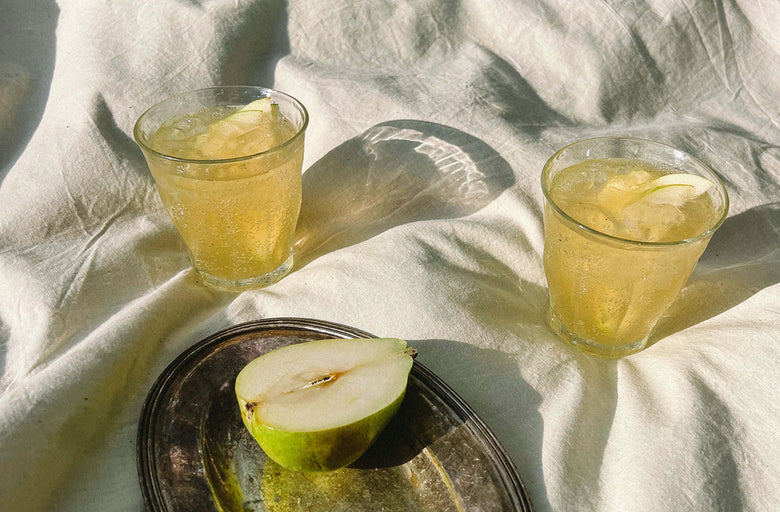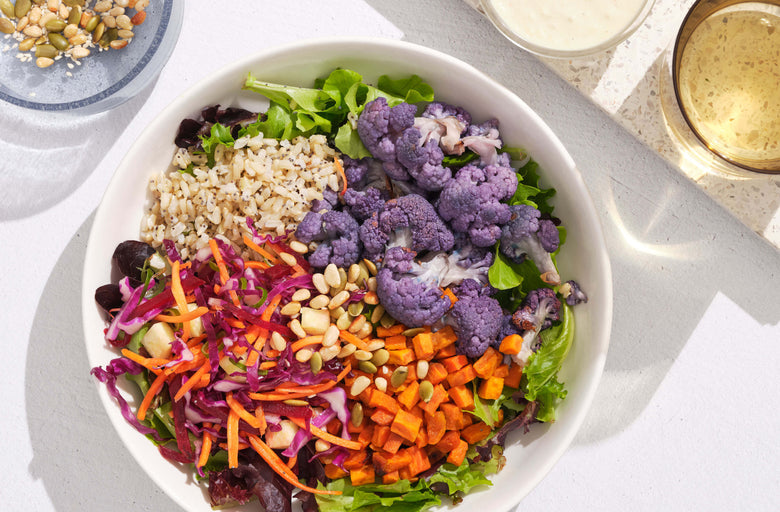When topics like plant-based eating or the microbiome make the news, we always get a little thrill—it makes us feel like proud parents. And we know you share our desire to stay up on developments in science and spirit, to indulge our curiosity, and to tap into the collective consciousness of everything from the microbiology of the gut to the waxing and waning of the moon.
In the spirit of remaining ever open to new knowledge, we’re giving this ongoing conversation its very own home on S Life. Each month, we’ll bring you the latest in health, wellness, and nutrition, and share dispatches from Sakara HQ. It’s all part of our bigger mission to feed your body and your mind.
THE SCIENCE
The Impossible is now possible
It’s fitting that, during peak BBQ season, burgers were in the news. Specifically, the Impossible Burger, a meat-free patty so named for its uncanny resemblance (yes, it “bleeds”) to an actual beef burger. Around the country, a battle has been brewing over whether the Impossible Burger and other plant-based patties can legally be called “burgers” at all. The ACLU is siding with food manufacturers that make plant-based meat alternatives, claiming states that restrict the use of terms like “burger” or “sausage” are censoring these companies while giving unfair advantage to the meat industry. The controversy highlights the growing tension between a desire for more environmentally sustainable food options and the importance of truth in advertising; experts point to a future in which lab-grown meat is marketed to consumers as the real thing.
The drama hasn’t stopped the rise of the Impossible Burger, which has been appearing everywhere from hipster restaurant menus to Burger King drive-thrus in recent months. Thanks to recent clearance from the FDA, its next stop will be grocery stores, which had previously banned the sale of raw Impossible patties due to the presence of soy leghemoglobin. That not-so-secret plant-based ingredient, sourced in this case from yeast, is what gives Impossible Burgers their meatiness.
Meanwhile, the mad scientists at Impossible Foods are shifting their focus to your favorite morning ritual with their investment in Atomo, the maker of a new bean-free coffee. Touted as a more environmentally sustainable version of traditional joe, it’s created using the molecular makeup of actual coffee. The company claims to have successfully mimicked coffee’s aroma, mouthfeel, flavor, color, and caffeine effects without using a single actual coffee bean.
Amid the growing popularity of these alternative foods, it’s clear there’s a cultural shift afoot. Whether for the health of themselves, the planet, or both, people are seeking more choices when it comes to their food. Want to reduce your own impact on the Earth while also reaping body benefits? Eat more plants. Every meat- and dairy-free day reduces your carbon footprint by eight pounds.
An apple core a day might keep the doctor away
If you’re trying to eat a gut-friendly diet—and considering its myriad benefits both inside and out, you should be—then you probably know to load up on fiber-rich plant foods, which offer nourishment to the beneficial bacteria in your G.I. tract. You may also pop a daily probiotic to double down on those results. At the end of the day, it’s all about diversity. That’s why so many probiotics on the market tout their CFUs (colony-forming units) and complementary strains.
Offering five grams of fiber, one large apple a day is a good way to up your daily intake of this crucial nutrient, but the gut benefits of this humble fruit go beyond its fibrous flesh. In fact, it could even replace that daily supplement. The average apple contains 100 million bacteria, many of them potentially beneficial—but there’s a catch. The majority of said bacteria are found inside the fruit. So the next time you bite into a shiny Gala or fresh-picked McIntosh, don’t toss the core. You’ll reap the maximum probiotic benefits (while helping save more than $13 billion a year in food waste). Go ahead and spit—or plant—the seeds.
And in related news, your season shift from Provencal rosé to a full-bodied Malbec could also come with gut benefits, according to research that links polyphenols in red wine to healthy bacterial diversity.
The dirty truth about eco-conscious packaging
What is it about those molded, brown paper bowls at Sweetgreen that just feel eco-friendly? Despite their rustic recycled vibe, they may not be what they appear. A recent report from the New Food Economy revealed the compostable packaging at many fast-casual eateries contains PFAS, or per- and polyfluoroalkyl substances. These compounds are also called “forever chemicals” because they don’t break down easily, meaning they lurk in places like groundwater, soil and even our own bloodstreams.
Manufacturers of compostable packaging made from recycled waste fibers use PFAS for their durability—they keep that miso-sesame-ginger dressing from leaking onto your desk. But health experts are concerned that not enough is known about the effects of this class of chemicals on human health; there are potential links to obesity, reproductive issues and cancer.
In other news…
-A good reason to get back to nature and breathe some fresh air: a new study links exposure to air pollution with increased risk of depression and bipolar disorder.
-Add brain shrinkage to the list of side effects of obesity. New research finds a connection between obesity and thinning of the cerebral cortex, the region of the brain where most information processing occurs. Changes to this part of the brain are associated with neurological diseases like Alzheimer’s.
-If you plan on soaking up some of that late-summer sun, add red peppers, carrots, sweet potatoes, spinach and broccoli to your plate. Consumption of these vitamin A-rich foods may lower skin cancer risk.
-The keto diet is still enjoying its 15 minutes of fame, but questions remain about its long-term health effects. According to Harvard nutrition expert Walter Willett, while the eating plan has promise, quality matters, and the best fats come from plant sources—think olive oil, avocado, and nuts. Bacon and cow’s milk cheese, not so much.
-According to new recommendations from the U.S. Preventive Services Task Force, more women should be tested for mutations of the BRCA1 and BRCA2 genes associated with breast and other cancers. Previously, the USPSTF advised that women who had a family history of certain cancers be assessed for gene mutations. The updated guidelines include women who have been diagnosed with and treated for these cancers in the past and those whose ancestry puts them at greater risk.
-A study found that increasing rates of depression in teens may be associated with a diet excessively high in sodium (found in processed and fast food) and lacking in potassium (found in whole, plant foods).
THE SPIRIT
New Year’s Day—the official start of the year, and the unofficial birthday of so many “best selves”—is still months off. But as soon as the calendar reads September and the quality of the light takes on that autumnal golden hue, we start thinking about self-improvement.
Maybe it’s the association—ingrained on us from our school years—of fall with freshly-sharpened pencils and empty notebooks waiting to be filled. Or maybe it’s the comedown from a summer of indulgences. There’s just something about this time of year that makes us crave a fresh start.
The Jewish faith is way ahead of us on this whole concept; Rosh Hashanah, which occurs from September 29 to October 1 of 2019, is the religion’s New Year. This is when the tone is set for the months ahead, as represented by the greeting, “l’shana tova tikateyvu,” or “May you be written [in the Book of Life] for a good year.”
On that note, here are the rituals and resolutions Sakara HQ is recommitting to this fall:
“Getting back to a daily skincare routine—nightly washing, toning, serums, the works!”—Danielle, Founder
“Walking my two-year-old to school—a new ritual I’m excited to start! (He insists on high-fiving every tree we pass, which forces me to slow down.)”—Freya, President
“Spending the first and last thirty minutes of my day off of my phone.”—Rae, Ops
“Going to the farmers market for my produce as much as possible! Not only to have a better understanding of where my food is actually coming from, but to support smaller businesses and also inspire me to cook with the seasons and use ingredients I may not normally buy at the grocery store.”—Erin, Graphic Designer
“Stretching every day!”—Taylor, Clean Boutique
“Putting my phone away when I am with my child.”—Fran, VP Brand + Creative
“Listening to a chapter of an audiobook every day during my subway ride.”—Hannah, S Life Editor
“Speaking to myself with only love and positivity rather than criticism and negativity. I am enough!” —Christina, Wellness Team






